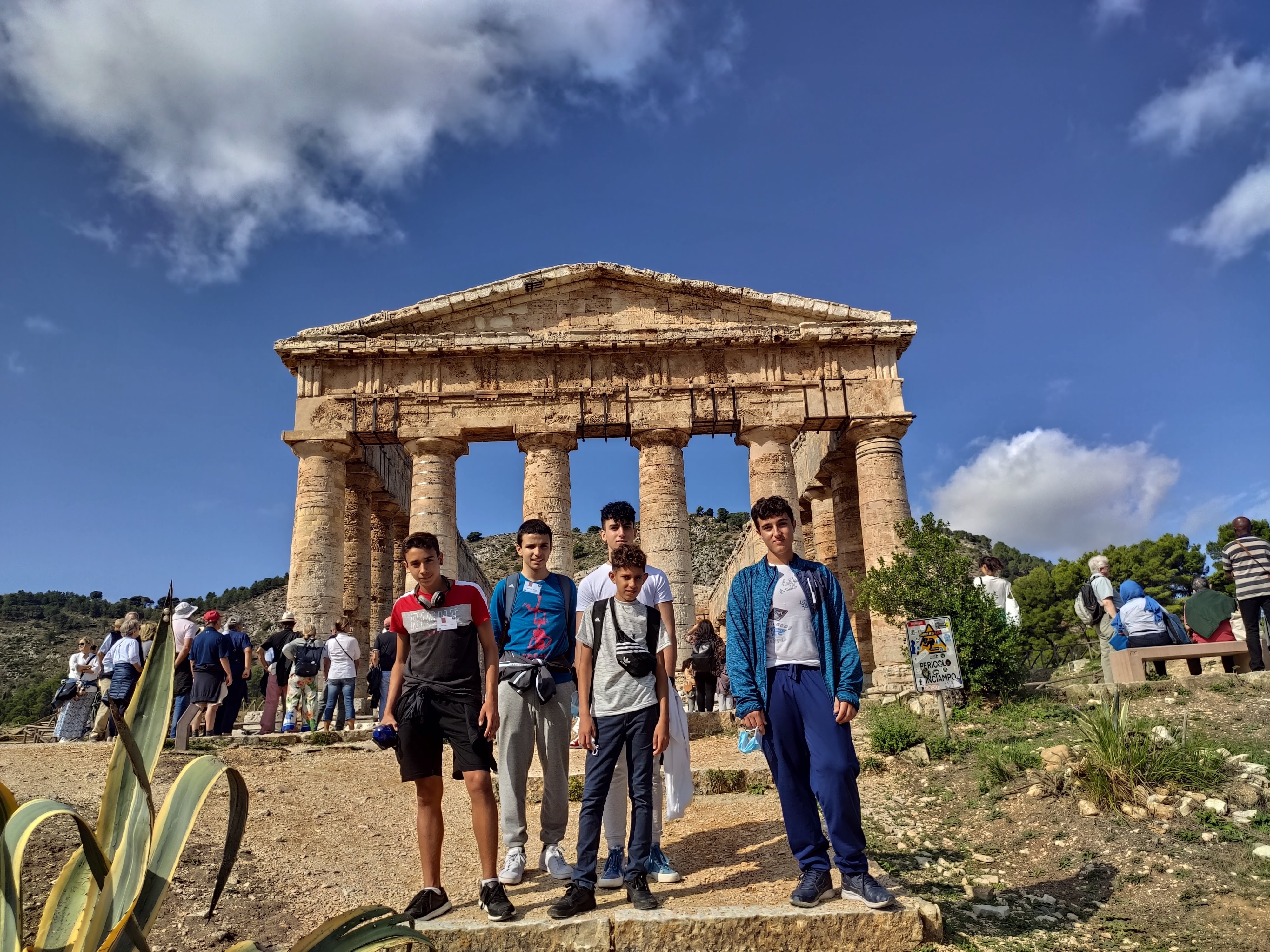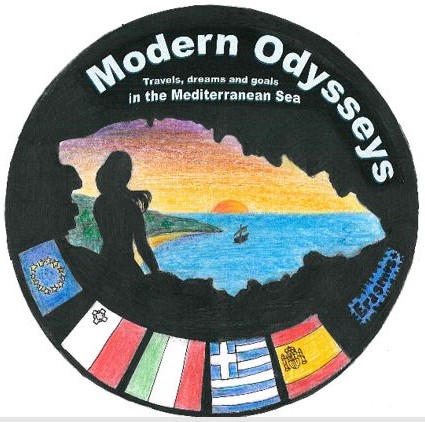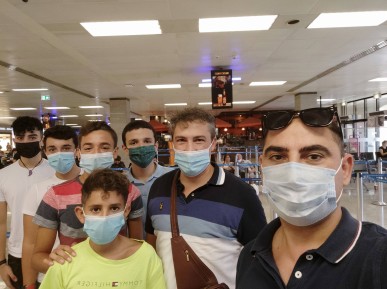
This is the fourth Erasmus+ school partnership the Sacred Heart Minor Seminary is participating in, providing our students with a more holistic approach to education that fosters active citizenship and a wider cultural awareness to our learners.
The project aim is to highlight the timeless value of Homer's Odyssey. The masterpiece describes the scourge, persistence and devotion of Odysseus whose target is returning back to his homeland, Ithaca. On his long return trip, Odysseus encountered twelve obstacles. The students will get to know the places he visited and their symbolism as well as their timeline. Students will identify modern Sirens, Calypsos and Cyclops and how to deal with them.
The aims are that students learn how to face difficulties that are going to find in their lives following the example of Ulises, with courage and persistence.
They are also going to communicate in English with other students to share ideas and different points of view about modern Odysseys that take place in our century comparing them with Homer's Odyssey.
For the first mobility, we visited the city of Alcamo in Sicily. Below is a day by day narration of this mobility.
Day 1
The first day started off with a warm welcome by the hosting school's students who greeted us with a parade of national flags of participating countries and later treated us to a wonderful rendition of the respective national anthems, sung by the school's choir. This was followed by brief introductory messages from Istuto Bagolino's principal and the Greek Education Director of the Ionian Islands which is responsible for more than 28,000 students.
Later Bagolino's dance troupe provided a modern interpretation of the immortal Tarantella, which provided the ideal kick-start to this day's busy schedule.
Representatives from the participating countries provided a detailed description of their respective schools, as well as on the socio-cultural backgrounds of the regions they hail from. This was immediately followed by a friendly competitive session where groups composed of participants from every country had to answer questions related to the information shared during the presentations.
After a brief break, we visited a local primary school and were invited to visit classes with ongoing lessons. Participants were also given a gift of traditional local produce and were treated to a more traditional Sicilian dance.
Following lunch at school, we visited two picturesque locations, Castelmare del Golfo and Scopello, areas of particular natural beauty featuring a limestone massif covered by lush line forests and bordered by crystal clear beaches and the famous Sea Fortress.
Photo opportunities were plentiful and this provided the right informal atmosphere for our participants to socialise with the other participants. This was maintained during dinner in Alcamo's historical centre this concluding a very particularly fruitful first day of the mobility.
Day 2
Drama Day. Yesterday, the participants embarked on a dramatic interpretation of The Odyssey. The distant rumbling of what turned out to be a massive thunderstorm provided an apt dramatic setting for The Odyssey. It did partially hamper our plans though, as we could not utilise an open-air amphitheatre.
Local students from Istituto Comprensivo S. Bagolino joined forces with the Maltese and Greek participants in studying lines from the XII Canto of The Odyssey. Their active participation was particularly encouraging since language barriers mattered very little as they managed to discuss stage directions and roles to guarantee a successful dramatic production.
A salient element in this production was the contemporary tone which alluded to current social malaises and challenges, echoing the temptations faced by Ulysses. This helped both actors and the audience to galvanise the timelessness of Homer's epic.
This drama workshop was followed by a detailed tour of the hosting school's facilities and brief observations of several classes. Local students were encouraged to ask questions to the foreign participants. It was noted that senior local students presented intriguing questions concerning the nature of the Maltese language and culture.
Following the passage of the storm, the Gozitan contingent took the opportunity to identify some of the many churches that dot Alcamo and enjoy these architectural and artistic marvels.
The day was concluded with an informal dinner hosted by the Greek contingents and it was yet another incredibly positive experience during which the students enjoyed good food and interaction with all participants.
Day 3
On Wednesday, we were treated to a thorough tour of the north-western point of the Sicilian Trinacria, of which Alcamo is a part. The tour kicked off with an immersion into the Greek heritage which is still dominant in Segesta. We climbed to the top of a plateau where an amphitheatre still stands and was still in use until the pandemic's restrictions set in. Apart from its historical significance, the amphitheatre offered some of the best views of the surrounding lands and Sicily's northern coast.
Following a walk down the slope dotted with aromatic herbs and pine trees, we headed towards an imposing Greek temple, constructed in the Doric order. This temple has been miraculously preserved, despite the many historical conflicts which raged in the area. Most of our participants had never been to an ancient Greek structure, so both the amphitheatre and the temple provided invaluable historical and architectural knowledge and awareness to our students. This was also perfectly in line with the project's Grecian theme.
The production of salt, one of the major economic activities in the Trapanese region, was our next didactic phase in the programme. As soon as we arrived at the massive salt pans, we noticed a large number of flamingos wading, paying little notice of the newly-arrived loudish group. In fact, Gerardo, the one in charge of the saltpans, is a member of the WWF and has emphasised the crucial role the salt pans play in the migration of large birds to and from Africa. Locals are proud of their region's contribution to the natural heritage and poachers are not an issue.
Surely, back in Malta, we could do with a healthy dose of such an approach towards wildlife.
Following lunch and a walk-in Trapani, a city dominated by large open plazas, belvederes and baroque churches, we headed to the mountaintop ancient city of Erice. This city is an architectural and historical gem influenced by Phoenicians, Greeks, Arabs and Normans and wars fought by the Carthaginians and Romans attempting to conquer it.
Alas, time does fly, and we had to return to our residences, before indulging in a feast of Italian food, concluding a most fruitful day.
Day 4
Erasmus+ projects are valued highly, both at the hosting school and in the community that supports them. In fact, the hosting school, Istituto Comprensivo S. Bagolino has multiple ongoing projects with teachers and parents pitching in to ensure that the students have access to the opportunities offered by such projects. It is truly a dynamic, and encouraging, demonstration of collaboration by teachers, students and parents, all fundamental stakeholders in a holistic programme of education, to ensure the positive outcomes of Erasmus+ programmes.
The hosting school’s projects are endorsed by the local administration, which seeks to welcome many students from all over Europe, following the two-year break imposed by the pandemic. This was the underlying message of speeches given by Alcamo’s mayor Domenico Surdi and the school’s headmaster, Antonio Provenza, to the participants and teachers gathered at the Palazzo Comunale (town hall) in Alcamo’s Piazza Ciullio.
It was then the local students’ turn to lead a tour around the historical centre of Alcamo which is bordered by mediaeval walls. The students took turns to share details about areas of particular interest, and at each stop, we were able to take in the surroundings, visit churches and museums which showcased the rich history of the city. The penultimate stop was at a large fountain, built by the Arabs and which is still providing copious amounts of fresh water from the surrounding mountains.
The tour’s crowning jewel was the castle, completed in 1350, which nowadays hosts multiple exhibitions and where currently there is a comprehensive display of regional vintage wine stocks. These are accompanied by thorough explanations on the methodologies used in wine production, with which Alcamo is synonymous.
A scavenger hunt spanning the historical centre of Alcamo, organised by the school’s P.E. teachers, tested the participants’ orienteering skills. It was very encouraging to see that a few rain showers did not dampen their spirits and all the teams successfully made it through all the checkpoints.
The weather did provide other challenges, especially when we descended on the 6 km beach at Alcamo Marina. Rain showers were frequent and abundant, but the young participants, without much hesitation, waded into the Tyrrhenian and had a whale of a time.
The evening was spent in great company with all the teachers and students who contributed to the fantastic week so far. Dinner was, unsurprisingly, of impeccable quality, which further galvanised the closeness of the participating groups, auguring well for the success of future mobilities.
Day 5
The final day of the mobility was a brief one at school since the groups had to prepare for departure back to their respective countries.
The first activity at school consisted of a digital escape room revolving around the theme of Odysseus and his perilous journey. Escape rooms have taken the young generation by storm and the idea was to have an actual physical activity, but this was not possible given the restrictions imposed by the pandemic.
The hosting school’s headmaster soon joined to bid us farewell, followed by a presentation of certificates of participation to teachers and students. It was evident that this mobility has been a success. Teachers were already making plans to establish the right conditions for further collaboration between the participating schools, possibly investing in further projects, apart from the ongoing one.
This is particularly good news for our school as it complements both our willingness and capabilities of expanding our international presence and thus we will be able to provide our students with as many opportunities as we possibly can. In doing so, we will be fulfilling our duty of furnishing our learners with a truly holistic education that ropes in academia, social and emotional skills, fostering independence and, ultimately forming responsible European citizens.








